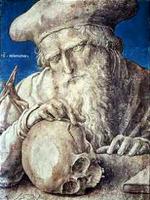 Saint Jerome, translator of Holy Scripture, was born in a little Dalmatian village on the Adriatic Sea around the year AD 345. At a young age he went to study in Rome, where he was baptized. After extensive travels, he chose the life of a monk and spent five years in the Syrian desert. There he learned Hebrew, the language of the Old Testament. However, the time spent there convinced him that the life of a hermit monk was not for him and he pursued holy orders and advanced education.
Saint Jerome, translator of Holy Scripture, was born in a little Dalmatian village on the Adriatic Sea around the year AD 345. At a young age he went to study in Rome, where he was baptized. After extensive travels, he chose the life of a monk and spent five years in the Syrian desert. There he learned Hebrew, the language of the Old Testament. However, the time spent there convinced him that the life of a hermit monk was not for him and he pursued holy orders and advanced education.After ordination at Antioch and visits to Rome and Constantinople (where he studied under Gregory of Nazianzus), Jerome settled in Bethlehem. From the original Hebrew, Aramaic, and Greek, he used his ability with languages to translate the Bible into Latin, the common language of his time.
Jerome chose to use "street" or "vulgar" Latin rather than its classical form. Thus, his translation was called the Vulgate (from its vulgar Latin) and was the authoritative version of the Bible in the western Church world for over 1,000 years.
A man of considerable brilliance, Jerome could also be argumentative, arrogant, dogmatic in trivial matters, and easily swayed by people holding superior office. Yet he also was able to break with the influence of Origen under which he was raised and was a champion of understanding the original languages of Scripture and of exegesis over allegory in interpretation. In Roman Catholic hagiography, he is patron saint of translators and librarians. His symbol in Christian symbolism is often a pen. In art, he is often portrayed with an odd blend of clothing and trappings from an aescetic anchorite and a cardinal and is usually posed with a crucifix, a skull, and a Bible.
Considered one of the great scholars of the early church, he is listed with Saints Augustine, Ambrose, and Gregory the Great as one of the original Four Doctors of the Western Church. He died on 30 September AD 420. Originally interred at Bethlehem, his remains were eventually taken to Rome.
More information is available from James Kiefer's Hagiographies and Wikipedia.
Collect of the Day
O Lord, O God of truth, whose Word is a lantern to our feet and a light upon our path: We give you thanks for your servant Jerome, and those who, following in his steps, have labored to render the Holy Scriptures in the language of the people; and we pray that your Holy Spirit will overshadow us as we read the written Word, and that Christ, the living Word, will transform us according to your righteous will; through Jesus Christ our Lord, who lives and reigns with you and the Holy Spirit, one God, now and forever.
Lection
Psalm 19:7-11(12-14) or 119:97-104
2 Timothy 3:14-17
Luke 24:44-48
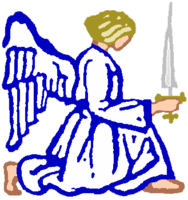 On the Feast of Saint Michael and all Angels (or Michaelmas) we thank God for the many ways in which He lovingly watches over us, both directly and indirectly. We also remember that the richness and variety of God's creation far exceeds our knowledge of it.
On the Feast of Saint Michael and all Angels (or Michaelmas) we thank God for the many ways in which He lovingly watches over us, both directly and indirectly. We also remember that the richness and variety of God's creation far exceeds our knowledge of it.The angels are referred to as "messengers of God," or simply as "messengers." The word for a messenger in Hebrew is malach, in Greek, angelos, from which we get our word "angel."
Michael (the name means "Who is like God?") is said to be the captain of the heavenly armies. In the Scriptures, Daniel (10:13, 21; 12:1) calls him prince of the people of Israel; Jude 9 notes an apocryphal story of a dispute with the devil about the body of Moses; Revelation 12:7 shows him leading the heavenly armies against those of the great dragon. He is often pictured in full armor, carrying a lance, and with his foot on the neck of a dragon.
Why do we call him "Saint" Michael? Isn't this word reserved for God's holy people? Well, the word actually means "holy," that is dedicated and set aside for a special Godly purpose or having an intrinisic goodness. Thus, all of God's people are holy, and thus saints — especially the dead in Christ. Yet by the same reckoning, so also Michael and all the angels are "holy."
Many theologians through the centuries have suggested that Michael is actually a theophany, a divine manifestation of the Son of God. Reading the passages where he is mentioned doesn't convince me entirely one way or another. The name itself is intriguing: If we answer the question, "Who is like God?" we must say, "No one, except God."
Also, while Christian literature, liturgics, and hymnody is filled with references to archangels, Michael is the only being in Scripture called an archangel. The prefix normally means ruling, chief, principal and can also carry the meaning of a prototype or an earlier model.
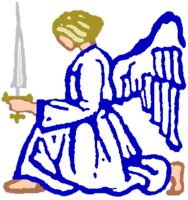 We know that Jesus testifies of His Father: He was and remains the principal (arch-) messenger of God's grace. He also preceded the existence of the angels, being alive from all eternity. In fact, He not only is the great messenger of God's Word, He is God's Word. Thus, understanding the Son as the archangel, the primary and ruling messenger of the Father is totally congruent with Scripture's revelation.
We know that Jesus testifies of His Father: He was and remains the principal (arch-) messenger of God's grace. He also preceded the existence of the angels, being alive from all eternity. In fact, He not only is the great messenger of God's Word, He is God's Word. Thus, understanding the Son as the archangel, the primary and ruling messenger of the Father is totally congruent with Scripture's revelation.I say this not to attempt to persuade the reader to accept the idea that Michael is the Son of God but to open the mind to the possiblity that they could be one and the same.
As for the angels, there are numerous times and places where they are mentioned. Yet all the spirit beings who serve God are not called angels by Scripture. While we often in our thinking lump them together, a number of distinct created beings exist. When reading the Pauline epistles, many early theologians took as titles some of the descriptive language he used in writing of the spiritual realm. They came up with nine "choirs" or ranks of angels, normally grouped in three triads. Their order varied among the different commentators. For example, Pseudo-Dionysias ranked them (in ascending order) as seraphim, cherubim, thrones, dominions, virtues, powers, principalities, archangels, and angels.
Cherubim, seraphim, angels and at least one archangel we know of definitely from the Bible. Whether or not "thrones, dominions, virtues," and the like are also specific creatures or whether they're rather general characteristics of the spirit beings, these lists appear to have omitted one class of being in Scripture, the "four living creatures" mentioned in Ezekiel and Revelation.
These lists have made it into our liturgy, where the Communion Preface speaks of "angels and archangels and all the company of heaven." They've also been incorporated into our hymnody, most notably "Ye Watchers and Ye Holy Ones."
Collect of the Day:
Everlasting God, who has ordained and constituted in a wonderful order the ministries of angels and mortals: Mercifully grant that, as your holy angels always serve and worship you in heaven, so by your appointment they may help and defend us here on earth; through Jesus Christ our Lord, who lives and reigns with you and the Holy Spirit, one God, now and forever.
Lection:
Psalm 103 or 103:19-22
Genesis 28:10-17
Revelation 12:7-12
John 1:47-51
28 September AD 935
Actually, he wasn't a king (he was Duke of Bohemia), but we can reckon Wenceslaus I as "good" because of his fidelity to the Christian Faith.
His grandfather, Bořivoj I, Kníze (Duke) of the Czechs was converted by Saints Cyril and Methodius, the noted missionaries to the Slavic people. After his father Wratislaus I died in battle against the Magyars, Wenceslaus succeeded him. His religious life followed the teaching of the Church rather than that of his mother Drahomíra the Arrogant while his brother Boleslaus I (the Cruel) apparently pursued his mother's pagan ways. Their sister Střezislava received the appellation "the Pretty."
After Vratislav died, Wenceslaus was raised by his grandmother Ludmila, who reared him in the Faith. A dispute between the fervently Christian regent and Drahomíra drove her to seek sanctuary near Beroun. Wenceslaus's conversion enraged his mother, who was trying to gain support among the pagan nobility. Drahomíra's revenge was having Ludmila killed by two nobles at Tetin on 15 September 921.
Regency passed to Drahomíra, who is accounted well in that area. She strengthened Czech borders against foreign incursions and suppressed the rival Slavnik clan. However, she still worked to reconvert her son to paganism, but Wenceslaus continued practicing Christianity in secret.
Upon attaining his majority, Wenceslaus assumed the rule and exiled Drahomíra. He aided Christianity's spread throughout Bohemia by building churches and cathedrals and also by accepting the influence of the Holy Roman Empire. To the nobles, such behavior threatened both their pagan traditions and Czech sovereignty. He became a vassal of King Henry I the Fowler of Germany in 929. This submission, whether by choice or by force, further increased the hostility of his non-Christian lieges.
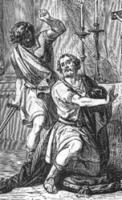 Boleslaus gathered some of these disaffected nobles around himself for several overlapping purposes. First of all, Wenceslaus was a threat to their paganism (unlike Wenceslaus, Boleslaus completely agreed with his mother's beliefs). Secondly, they considered Wenceslaus a "sell-out" if not an outright traitor to Czech heritage and governance. Finally, Boleslaus was next in line for the throne — something he strongly coveted.
Boleslaus gathered some of these disaffected nobles around himself for several overlapping purposes. First of all, Wenceslaus was a threat to their paganism (unlike Wenceslaus, Boleslaus completely agreed with his mother's beliefs). Secondly, they considered Wenceslaus a "sell-out" if not an outright traitor to Czech heritage and governance. Finally, Boleslaus was next in line for the throne — something he strongly coveted.These factors led the younger brother to invite the elder to a celebration of the Feast of Saints Cosmas and Damian. On the way there, Boleslaus or his henchmen murdered Wenceslaus — the most commonly purported venue being at the very doors of the church toward which they traveled. Bolesaus claimed the title "Prince" — "Duke" being considered recognition of vassalage to the Holy Roman Empire.
Upon his death, his son Boleslaus II became Duke of Bohemia. Contrary to the father's nickname "the Cruel," the younger son was known as Boleslav the Pious. Included among his accomplishments was the establishment of the Bishopric of Prague.
Meanwhile, the legend of Wenceslaus continued to grow in the telling. His piety and refusal to abandon Christianity remain part of the story of the Faith. The Church considered him a martyr and purported miracles followed his invocation. Thus, he was canonized as Saint Wenceslaus. He is the primary patron of the Czech people and the Czech Republic.
The Christmas carol "Good King Wenceslas" was based upon a perception of his piety, humility, and desire to serve. Whether or not grounded in an actual event, it reflects the esteem in which the Czech people hold him.
Today marks the 49th anniversary of the death from cancer of Mildred Ella "Babe" Didrikson Zaharias (1911 – 1956). There's at least a tenuous Lutheran connection here (more on that in a moment) and I'd appreciate learning more.
With Janis Joplin, she's one of the two most famous women to come from Port Arthur, Texas. Unlike "Pearl," the "Babe" never seemed to sour on her hometown. During the first half of the 20th Century, I'd be hard pressed to find a better known and more universally admired and respected woman in the United States with the possible exception of Eleanor Roosevelt — and Babe didn't have to marry a politician to gain her fame.
Nope, she got respect the "old fashioned way" — she earned it. She was a natural athlete who honed and enhanced her skills to a degree previously seen in mainly male sports figures. She received her Ruthian nickname as a youngster after hitting five home runs in one baseball game.
Competing at a time when women's athletics were viewed with suspicion by many, Babe entered eight events in the 1932 Olympic Trials. Unfortunately, the Games only allowed her to compete in three. She won the javelin and 80 meter hurdles and tied for first in the high jump. Because the judges didn't like her jumping style (even though it wasn't illegal and she wasn't disqualified) they gave the gold to fellow American Jean Shiley while Babe received the silver. After the Games, Shiley and Didrikson showed their opinion by splitting the two medals with each keeping half.
Babe was also a talented basketball player who starred on an AAU team for several years.
 Ultimately, golf became her greatest sport. Babe was the first marquee women's player. She dominated on the amateur and professional circuits, winning a total of 10 majors as a pro during a period when there were only three majors each year. In 1950, her greatest year, she won all three majors (the US Open, the Titleholders Championship, and the Western Open) and led the money-list.
Ultimately, golf became her greatest sport. Babe was the first marquee women's player. She dominated on the amateur and professional circuits, winning a total of 10 majors as a pro during a period when there were only three majors each year. In 1950, her greatest year, she won all three majors (the US Open, the Titleholders Championship, and the Western Open) and led the money-list.Until Annika Sörenstam and Michelle Wie almost sixty years later, Babe Didrikson was the only woman to compete in a men's PGA tournament (1945). She was also a founding member of the LPGA.
She married popular former wrestler George Zaharias in 1938. The marriage only lasted a short time — Babe divorced him when he admitted that he was a homosexual. However, she kept the name until her death.
Babe's life ended while she was still a superb athlete. Even after the cancer began affecting her, she continued her golfing career. After a brief remission, the cancer returned in 1955 and she only played in 8 events. She still managed to win two of them.
The Associated Press named her its Female Athlete of the Year six times and in 1950, she was voted Woman Athlete of the First Half of the 20th Century in an AP poll. When ESPN listed the the 50 top athletes of the 20th Century, she was the highest ranked woman.
Her death leads me to the Lutheran connection: According to the New York Times Magazine, she was buried out of Bethlehem Lutheran Church (ALC, now ELCA) in Beaumont, Texas — just up the road from Port Arthur. Her grave is in Beaumont's Forest Lawn Memorial Park. If anyone knows whether she grew up Lutheran or was active in the church during her adult life, I'd be happy to add the information.
Lancelot Andrewes was born in London in 1555. Possessed of a keen intellect, he studied at Cambridge and Oxford, was a distinguished lecturer, and entered religious orders in 1580. A career that saw him enjoy working among the people while still challenging himself and others intellectually led to royal associations and eventual consecration as Bishop of Chichester in 1605 and a position as lord almoner. In 1618, he attended the Synod of Dort, made dean of the Chapel Royal, and became Bishop of Winchester.
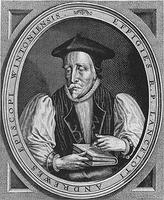 Active in church and secular politics, especially in their overlap, Andrewes advised James I of England and was on the committee of scholars responsible of the Authorized Version of the Bible. Indeed, his name is first on the list of translators, since he both provided translations of early parts of the Old Testament and served as an editor general of the entire work.
Active in church and secular politics, especially in their overlap, Andrewes advised James I of England and was on the committee of scholars responsible of the Authorized Version of the Bible. Indeed, his name is first on the list of translators, since he both provided translations of early parts of the Old Testament and served as an editor general of the entire work.Versed in Latin, Greek, Hebrew and eighteen other languages, Andrewes enjoyed popularity during his life for writings. Next to Bishop Ussher, most considered him the most learned churchman of his day. Large collections of his sermons remain. He published two essays against Robert Bellarmine.
Perhaps one of his finest works was the Preces Privatae (Private Prayers). The collection was, however, unavailable to contemporaries but were published after his death. Some sections are complete prayers and collects, other appear to be guides to devout meditation. A biography by James Kiefer includes quotes from the Preces. These selections from the Thursday prayers emphasize three important happenings on that day — the creation of birds and fish on the Fifth Day of Creation, the institution of the Lord's Supper, the Ascension of our Lord on Easter's 40th day.
Andrewes' impact on English arts and letters extended well beyond his life. T. S. Eliot considered him a major influence and wrote an essay in his honor.
Yes, Brian Braatz: Nonpareil hosts this week's confessional blogorama, aka the Lutheran Carnival. He asked those interested to submit musical offerings and received some on that topic as well as other vocational and theological posts.
Note: My 2007 commemoration of the Venerable Sergius includes much additional information plus several illustrations.
To Russians, Sergius is both national hero and an example of Russian spiritual life at its best. His posterity reminds us of William Tell among the Swiss or Joan of Arc with the French. He was born in Rostoff around 1314, the son of a farmer.
When he was twenty, he and his brother began living as hermits in a forest near Moscow. Others joined them in what became the Monastery of the Holy Trinity, a center for the renewal of Russian Christianity. Pilgrims came from all Russia to worship and to receive spiritual instruction, advice, and encouragement. At the time, Russians were largely controlled by the neighboring (non-Christian) Tatar (or Tartar) people. Sergius rallied the people behind Prince Dmitri Donskoi, who defeated the Tatars in 1380 and established an independent Russia.
Possessed of a winsome personality, Sergius was also a gentle man. Accounts bear strong resemblance to those told of Francis of Assisi, including a special affinity which he and animals held for each other. He had the ability to inspire in men an intense awareness of the love of God, and a readiness to respond in love and obedience. He remained close to his peasant roots. One contemporary said of him, "He has about him the smell of fir forests." To this day, his effect on Russian devotion remains considerable.
Two major convents on the outskirts of Moscow preserve the recollection of the freedom for which he urged Dimitri to fight. One is the fortress of the Donskoi Monastery, under the Sparrow Hills. The other is the Simonov Monastery on the banks of the Mosqua — a place of beauty chosen by the saint himself.
When eighty-four year old Metropolitan Alexis knew his life was ending, he desired to give Sergius his blessing, appointing him as successor. But the humble monk, in great alarm, declared that he could not accept and wear the sacred picture of the Blessed Virgin suspended by gold chains, which the primate had sent him from his own breast upon which it had hung. "From my youth up," said Sergius, "I have never possessed or worn gold, and how now can I adorn myself in my old age?"
St. Sergius died at an extremely advanced age in 1392, to the almost universal sorrow of his contemporaries.
Suggested Collect
O God, whose blessed Son became poor that we through his poverty might be rich: Deliver us from an inordinate love of this world, that we, inspired by the devotion of your servant Sergius of Moscow, may serve you with singleness of heart, and attain to the riches of the age to come; through Jesus Christ our Lord, who lives and reigns with you and the Holy Spirit, one God, for ever and ever.
Suggested Lection
Psalm 34:1-8 or 33:1-5, 20-21
Ecclesiasticus 39:1-9
Matthew 13:47-52
Consider with me the marriage rite:
The union of husband and wife in heart, body, and mind is intended by God for the mutual companionship, help, and support that each person ought to receive from the other, both in prosperity and adversity. Marriage was also ordained so that man and woman may find delight in one another and thus avoid sexual immorality. Therefore all persons who marry shall live within their vows and so keep themselves undefiled as members of the body of Christ. Finally, God established marriage for the procreation of children to be brought up in the fear and instruction of the Lord and to offer Him their praise. So has God established the holy estate that Name and Name wish to enter. They desire our prayers as they begin their marriage in the Lord's name and with His blessing.
What's not to love in all of this? In marriage, God gives us a dear and true friend, help for the hard tasks, someone to laugh and cry with us, to support us, to love us. He gives a man and a woman each other's bodies and allows and encourages the joy and passion of sexual union. He often blesses the marriage with children. He gives a place where faith can be nurtured and practiced through faithful church participation, family devotions, and generally by living out vocation as husband and wife.
What do people do in response? Many come to the Church, asking to be married in it, even though they otherwise show no interest in God or His people. They want songs with no religious content or others that are filled with a vague (and often unbiblical) spirituality. Brides (or their mothers) often (usually?) treat what should be a solemn yet joyful religious service celebrating "the union of husband and wife in heart, body, and mind" into Queen for a Day, with the bedecked and bejeweled bride as star.
The men (including, often, the groom) are sort of along for the ride. They show up early for pictures and seem to be little more than pawns in the hands of a photographer or a "wedding coordinator." They end up with way too much time on their hands and all too often fill it by emptying beer and liquor into their bellies as they gather in clumps on the church parking lot.
Should a pastor suggest singing a hymn or two during the ceremony, he's often met with blank stares or flat denials. He regularly has to remind guests that a religious ceremony is not the place for moving about with flash cameras. He often needs to remind "gentlemen" to remove hats and prays that the bride or other "ladies" don't show up on wedding day exhibiting more skin than one sees on a summer day at the beach.
The "Unity Candle," a recent ecclesiastical innovation, is my personal nomination for latter-day "Abomination of Desolation." The flow of the service is interrupted; if no suitable place exists, they want to set it in the center of the altar where the presence or the memory of the Lord's body and blood should always take precedence. Not only is is liturgically inappropriate, it also drips wax and threatens to tip and teeter to the floor.
And don't get me started about people who want to change the paraments because the colors on the altar clash with the colors chosen by the bride. I've seen the "best" man pretend to have lost the rings as the party stands before God's altar, raising guffaws rather than amens. At one church (not one I pastored, thank God!) a mother objected to the "thing" sitting in the middle of the center aisle. The pastor firmly told her that the "thing" was the baptismal font and that — even if it weren't one with the concrete floor — one did not hide away the visible symbol of this rich Means of Grace.
Since the comment line is always open, I invite others to share wedding "horror" stories. However, as I said above, I also love marriage, and would enjoy hearing the stories of God-pleasing ceremonies and of years of Godly life as husband and wife. I promise that I'll share ours, too.
And now I must hasten off to shower and dress for today's ceremony.
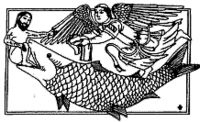 A singular prophet among the many in the Old Testament, Jonah the son of Amittai was born about an hour's walk from Nazareth. His prophetic ministry involved a call to preach at Nineveh, capital of pagan Assyria (Jonah 1:1-2). His reluctance to respond and God's insistence that his call be heeded is the story of the book that bears Jonah's name.
A singular prophet among the many in the Old Testament, Jonah the son of Amittai was born about an hour's walk from Nazareth. His prophetic ministry involved a call to preach at Nineveh, capital of pagan Assyria (Jonah 1:1-2). His reluctance to respond and God's insistence that his call be heeded is the story of the book that bears Jonah's name.Although the swallowing and disgorging of Jonah by the great fish is the most remembered detail of his life, the book address it in only three verses (Jonah 1:17; 2:1, 10). The important theme is how God deals compassionately with sinners.
Jonah's three day sojourn in the belly of the fish is mentioned by Jesus as a sign of His own death, burial, and resurrection (Matt 12:39-41).
One day Jesus was walking and saw a tax collector named Matthew sitting at a tax collection post, and said to him, "Follow Me." Matthew stood up and followed Him, becoming one of His twelve apostles (see Mt 9:9-13; parallels Mk 2:13-17 and Lk 5:27-32).
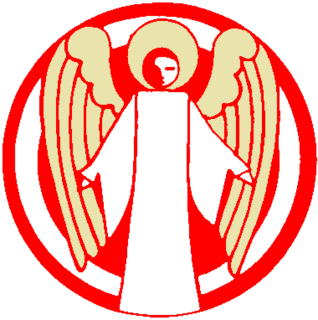 Tax collectors in those days were social outcasts. Devout Jews avoided them because they were usually dishonest (they were expected to make their profits by cheating the people). Nationalistic Jews hated them because they were agents of the Roman government and doubly hated them if (like Matthew) they were Jews, because they had gone over to the enemy, betraying their own people for money.
Tax collectors in those days were social outcasts. Devout Jews avoided them because they were usually dishonest (they were expected to make their profits by cheating the people). Nationalistic Jews hated them because they were agents of the Roman government and doubly hated them if (like Matthew) they were Jews, because they had gone over to the enemy, betraying their own people for money.Throughout the Gospels, we find tax collectors (publicans) mentioned as a standard type of sinful and despised outcast. Matthew brought many of his former associates to meet Jesus, and social outcasts in general were shown that the love of God through His Son extended even to them.
The name "Matthew" means "gift of the Lord." Mark and Luke, in the story of his calling, name him "Levi." Perhaps this was his original name, and he received a new name from Jesus when he became a disciple. Perhaps he was a member of the tribe of Levi. Of Matthew's life after Pentecost, the Scriptures tell us nothing. Later accounts vary: Some report that he was martyred, others that he died a natural death. The Christian community since early times has commemorated him as a martyr.
Any Christian hates crime. Is crime an expression of hatred? Many are. Should there be a special category of offenses designated as hate crimes? Now there's the rub.
Our U.S. House of Representatives passed a "Children's Safety Act" (H.R.3132) a few days ago. The initial bill was aimed at protecting our young people from sexual predators. An ammendment proposed by Rep. John Conyers passed and became part of the act. This ammendment has nothing at all to do with sex offenders attacking children and everything to do with special-interest pandering, promoting homosexual "rights," and allowing the federal government to intrude even more in local and state government.
Title X of the Act is now "Local Law Enforcement Hate Crimes Prevention." Following previously established language, a "hate crime" is "a crime in which the defendant intentionally selects a victim, or in the case of a property crime, the property that is the object of the crime, because of the actual or perceived race, color, religion, national origin, ethnicity, gender, disability, or sexual orientation of any person." Such language prioritizes the heinousness of offenses over and above the actions themselves merely by the perpetrator's choice of victims and his feelings about a certain group of people.
My concerns are several. First of all, I consider any crime of violence to be one of hate. Second, I think that the bill far outsteps the (already stretched beyond belief) constitutional limits for federal jurisdiction. Third, the bill's fuzzy language ("perception" is used 7 times in Title X) leaves it open to broad and intrusive interpretation. Fourth, the bill especially addresses issues of sexual orientation and "gender identity," providing special protection for those choosing to wallow in immoral behavior. Finally, the bill is, in my opinion, a classic "slippery slope" and provides a rallying point for those who would tighten the screws against verbal and written condemnations of deviant lifestyles.
You'll probably find any number of blogs and news items concerning the bill. Before that, read its entire content and explore its background through Thomas — U.S. Congress on the Internet. To get started, just copy and paste H.R.3132 in the Thomas search field, click "Enter bill number," and "Search."
As for me, I've written the following letter to my two senators:
Dear Senator ____,
While I laud the initial Children's Safety Act, I'm appalled and alarmed at the inclusion of the "hate crime" ammendment. It seems poorly written and intentionally vague, yet also intended to stifle moral and religious objection to certain behaviors and lifestyles.
I urge you and the Senate to please return the bill to its original form or reject it outright.
Am I an alarmist? Consider that our "neighbor to the north" has moved on to a subsequent legislative step and is regulating "hate speech." Already a Canadian pastor, Stephen Boissoin of Alberta, faces his province's Human Rights Tribunal because of a letter published in a newspaper, the Red Deer Advocate.
Boissoin's letter didn't call for violence, boycotting, or any other damaging actions against Canadian citizens. He merely challenged the unbalanced promotion of homosexuality in public education. A sample sentence from his letter reads, "Children as young as 5 and 6 years of age are being subjected to psychologically and physiologically damaging pro-homosexual literature and guidance in the public school system; all under the fraudulent guise of equal rights."
All of this stems from a new (April 2004) Canadian law initially sponsored by homosexual MP Svend Robinson. The law includes a "harassment by communication" — meaning that one could be censured, fined, and even imprisoned for calling homosexually "deviant" or "morally wrong." While Robinson himself claimed that the law will protect religious expression, he sounds as if that really doesn't matter: Instead, he paints rallying behind free speech and religious expression as "a mask for homophobia for people who don't want to be honest about the real reason why they don't want to include sexual orientation in the law."
I honestly think that Conyer's ammendment to the Children's Safety Act places U.S. law on the precipice down which Canadian jurisprudence has already tumbled.
Condé Montrose Nast died on this day in 1942. He established a chain of magazines that defied prevailing publishing wisdom. Rather than emphasizing ever-increasing circulation numbers, Nast specialized, targeting selected income levels and areas of interest. In some ways, we might reflect that his strategy and its results anticipated the breakdown of "Big Three" television with the niche marketing of cable and satellite programming. Nast made a huge fortune, lost much of it during the Great Depression, and was in the process of trying to gain back his wealth when his life ended.
Certainly, much of the philosophy espoused by some of his publications, including Vogue, Glamour, Vanity Fair, The New Yorker, and, of course, Condé Nast Traveler, is contrary to the Christian faith and certainly can encourage covetousness. However, his business approach itself is quite congruent with Jesus' Parable of the Dishonest Manager (Luke 16:1-9). After telling the story, the Lord noted that "the sons of this world are more shrewd in dealing with their own generation than the sons of light. (v. 8)" Certainly, Nast figured out how to deal shrewdly with his "own generation."
For the Christian, however, the correct use of wealth and possessions is more important than their accumulation. Rather than grasping and hoarding, we "spend down" earthly treasures among those around us. Jesus concluded the parable by saying, "Make friends for yourselves by means of unrighteous wealth, so that when it fails they may receive you into the eternal dwellings. (v. 9)" We neither buy our own way into heaven nor bribe others to forsake this earth and follow Christ. However, we do have ample opportunity to share the blessings we receive, thus bridging gaps between ourselves and others and having freer course in speaking and living the Gospel as we live our earthly lives.
For this week's eclectic buffet of Confessional Lutheran blogs, please visit host Charles Lehman's Drowing Myself Whenever I Can.
Born in Florence, Italy, in 1265, Dante Alighieri stands among the true and lasting giants of Western letters. Unquestionedly the greatest Italian poet, many (I think rightly) laud him as one of the two or three absolute masters of all time. Yeats called him "the chief imagination of Christendom" while Eliot said, "Dante and Shakespeare divide the modern world between them. There is no third." Considering the artistic gifts of Yeats and Eliot, how can we argue?
Dante's Italy was not a united country (some would say this holds true to this day) but mainly a collection of small city-states. While we rightly think of Italy as the cradle of the Renaissance, the late Middle Ages saw the land embroiled in feuds and power struggles between noble families leading to an unending series of inter-state and civil wars. During Florence's May Festival in AD 1300, an accident led to a brawl which soon became a civil war. As heir of a poor but noble family, Dante was one of the city's elected officials. When the dust from the war settled, he and other leaders of his party were overthrown and exiled. He spent the rest of his life in exile, pining for his native Florence.
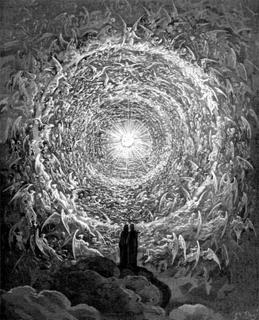 Dante's literary star began its ascendence in 1293, when he published the Vita Nuova (The New Life). Through it, he related falling in love with a young girl (Beatrice), finding happiness in thinking of her and looking at her from afar. His Beatrice would return as muse for his greatest work.
Dante's literary star began its ascendence in 1293, when he published the Vita Nuova (The New Life). Through it, he related falling in love with a young girl (Beatrice), finding happiness in thinking of her and looking at her from afar. His Beatrice would return as muse for his greatest work.Somewhere around 1304, he wrote De Vulgari Eloquentia. It argued that literature and poetry should be written in the "vulgar" (native) tongue of the people rather than in Latin. While not totally novel, this new approach helped usher in the great flood of works written for the masses during the end of the Middle Ages and the Renaissance. Indirectly, we might even find a connection to the "vulgar" Bible translations which began to be found, including those of Wycliffe, Luther, and others.
Il Convivio (The Banquet), written at the same time, discussed grammar and poetry. It claimed that some of his own works, especially those in the Vito Nuova, were been largely misunderstood.
In 1313 he tackled the kingdom of the left hand with De Monarchia (On Monarchy), an argument that that secular authority derives directly from God, not through the authority of the Church. However, he would not excuse godless government, noting that the prince should act as any other Christian, being guided by the Church's moral instruction.
We aren't sure when he began writing his masterpiece, the Commedia (Comedy). We need to understand that a "comedy," in the traditional sense, means an account beginning in sorrow, suffering, or other pain and ending in joy. While he gave it the single-word title, Giovanni Boccaccio later referred to it as The Divine Comedy, the name by which most still know it. Apparantly he finished the first of its three parts by 1314, completing the final portion just before his death on 14 September 1321.
The Comedy has since its creation inspired artists to draw, paint, or otherwise render its wonders. Among the most noted are Domenico di Michelino, William Blake, and Gustave Doré, whose interpretation of Dante and Beatrice viewing the highest heaven is shown above.
For more about Dante's life and times, and a more detailed examination of the Comedy, please follow the above links or see the biography from James Kiefer's Hagiographies.
During the reign of Constantine the Great, the first Roman Emperor to profess the Christian faith, his mother Helena went to Israel, hoping to find the places especially significant to Christians. Having located, close together, what she believed to be the sites of the Crucifixion and of the Burial (at locations that modern archaeologists think may be correct), she then had built over them the Church of the Holy Sepulcher, which was dedicated on 14 September 335. This became a day for recognizing the Cross in a festal atmosphere that would be inappropriate on Good Friday as a symbol of triumph, as a sign of Christ’s victory over death, and a reminder of His promise, "And I, when I am lifted up from the earth, will draw all people to myself. (John 12:32)"
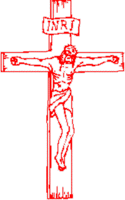 The Christian custom of tracing the sign of the cross on persons and things as a sign of blessing is very old. Some think that it goes back to the very origins of Christianity and earlier. In Ezekiel 9, we read that Ezekiel had a vision of the throne-room of God, in which an angel was sent to go through Jerusalem and put a mark on the foreheads of the faithful few who mourned for the sins of the city. Afterwards, other angels were sent through the city to destroy all those who had not the mark. We find similar visionary material in Revelation 7:2-4; 9:4; 14:1, where the mark on the forehead again protects the faithful few in the day of wrath, and is said to be the name of the Lamb and of His Father.
The Christian custom of tracing the sign of the cross on persons and things as a sign of blessing is very old. Some think that it goes back to the very origins of Christianity and earlier. In Ezekiel 9, we read that Ezekiel had a vision of the throne-room of God, in which an angel was sent to go through Jerusalem and put a mark on the foreheads of the faithful few who mourned for the sins of the city. Afterwards, other angels were sent through the city to destroy all those who had not the mark. We find similar visionary material in Revelation 7:2-4; 9:4; 14:1, where the mark on the forehead again protects the faithful few in the day of wrath, and is said to be the name of the Lamb and of His Father.What is the significance of the sign of the cross? In the first place, we often place our initials or other personal mark on something to show that it belongs to us. The Cross is the personal mark of Our Lord Jesus Christ, often traced upon our foreheads and hearts at our baptisms. We mark it on ourselves as a sign that we belong to Him, just as in the book of Revelation, as noted above, the servants of God are sealed or marked on their foreheads as a sign that they are His.
As one preacher said, if you were telling someone how to make a cross, you might say, "Draw an I and then cross it out." As we make the sign, we first draw a vertical stroke, as if to say to God, "Lord, here am I." Then we cancel it with a horizontal stroke, as if to say, "Help me, Lord, to abandon my self-centeredness and self-will; make Yourself the center of my life instead. Fix all my attention and all my desire on You, Lord, that I may forget my self, cancel my self, abandon myself completely to Your love and service."
Readings for Holy Cross Day:
† Psalm 98:1-5
† Isaiah 45:21-25
† 1 Corinthians 1:18-24
† John 12:20-33
Collect of the Day
Merciful and everlasting God, You did not spare Your only Son but delivered Him up for us all that He might bear our sins on the cross. Grant that our hearts may be so fixed with steadfast faith in Him that we may not fear the power of any adversaries; through Jesus Christ, your Son, our Lord, who lives and reigns with You and the Holy Spirit, one God, now and forever. Amen.
Suggested liturgical color is red.
For a more extended treatment of this day, plus the Anglican lection, please see James Kiefer's Hagiographies.
I'm somewhat remiss in announcing additions to my blogroll. However, just tonight I discovered that Ste. Em, one of my dearest theo-thug friends, has entered the Lutheran blogosphere with Quicunque vult. If you need a translation, follow the link. If it sounds vaguely familiar, it's the Latin title for what we normally call the Athanasian Creed.
I hope that Ste. Em uses every opportunity to share the gifts of intellect and faith with which our Lord has blessed her.
I'm also adding Blog from Mossback Meadow tonight, after spotting it in Lutheran Carnival V. I also encourage you to check out some of the others I read and to which I link.
The Redbirds own Major League Baseball's only single-digit magic number (7) for clinching their division, according to MLB's standings. They've also moved into single digits for home games remaining in "old" Busch Stadium (or Busch II, if you count the briefly renamed Sportsman's Park). Next year, they move into their new digs right next door.
My time to host the Lutheran Carnival ends a bit early. Dan got on the ball and started Carnival V a day earlier than we're accustomed. (Amazing how quickly habits get set in Lutherans and how it jars us when they're changed.) Tune in to Necessary Roughness and see what Dan put together for our enjoyment and edification.
As he suggested, several bloggers took his suggestion and followed Necessary Roughness's sports theme.
Still, I love Bob Waters and his latest attempt to gain sympathy for a team that will probably never gain the World Series. Bob's eisegesis leads him to proclaim that God is a Cubs fan.
Of course, God, as Ask the Pastor recently blogged, favors "the side with the best artillery." This cannot be the popgun-packing Little Bears.
All of his arguing that the Cubs truly live out a "theology of the cross" is only so much buncombe: It parallels the (satin-lined) hair shirt of false humility with which Cub fans are wont to cloak themselves.
To quote noted philosopher Lawrence Tureaud, "I pity the fool!"
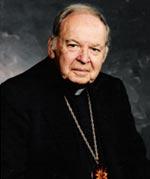 The Rev. Dr. Oswald C.J. Hoffmann, long-time speaker of The Lutheran Hour, died yesterday at age 91.
The Rev. Dr. Oswald C.J. Hoffmann, long-time speaker of The Lutheran Hour, died yesterday at age 91.Click here to continue reading the official statement from Lutheran Hour Ministries concerning this "renowned religious broadcasting pioneer and Protestant church leader."
To his credit, The Lutheran Hour's reach and influence spread under his watch. In many things, his voice was considered the voice of The Lutheran Church — Missouri Synod by many within and without the LCMS.
In other matters, especially regarding some of his theological and church political positions, "De mortuis nil nisi bonum dicendum est" — until we've reached a more appropriate time.

"Citius. Altius. Fortius. — Faster. Higher. Stronger." That's the motto of the Olympic Games. When the modern Games were first established, the man responsible for their revival was looking for an appropriate theme. He left us with a sense of unfinished business.
The Games don't approach us with a "been there, done that" attitude. They don't seek to find a peak level of performance and stay with it. We aren't promised the "fastest, highest, strongest" athletes. No, the Olympic spirit seeks always to better previous efforts. It may be one man struggling to top another's world record. It may be one girl reaching deep into her inner resources to exceed her personal best.
The life of the Christian on earth is parallel to this struggle to exceed. While content with our life in Christ, his Word and Spirit compel us to try harder to live according to His will. All of life becomes our Olympics, and Christians are invited to lay everything on the line for the Lord.
God doesn't call us to be couch potatoes. After saving us, He puts us on His "track" — the straight path to our heavenly home. More than any coach or trainer, He's with us every step of the way as we struggle, not against other athletes, but against "against the rulers, against the authorities, against the cosmic powers over this present darkness, against the spiritual forces of evil in the heavenly places, (Eph 6:12)" against the forces of Satan himself. We know that victory is already assured for those who believe in salvation through the merits of Jesus Christ. We now push to excel as disciples of our Savior.
This is in keeping with what Ephesians 2:8-10 tells us. Salvation is a gift of God, but in salvation we are converted into God's workmanship to do God's tasks. We live and give as Christians because we are celebrating the end of the race even as we still run it. The prize is already in our possession: We are children of the heavenly Father and heirs of the kingdom.
Now we "fight the good fight. (1 Tim 6:12)" We "press on toward the goal for the prize of the upward call of God in Christ Jesus. (Phil 3:14)" We wrestle with our own weaknesses, finding strength in Word and Spirit. Like boxers, we beat our flesh into shape. Our training table is the Lord's Supper — the Supper of Champions — where His body and blood give us nutrition perfectly balanced for our needs. This Supper also reminds us of our ultimate dinner, when we will dine in the heavenly courts, at the Victor's table forevermore.
Even in this life, in the midst of our Olympian struggles, we already have a gift promised by the Games, yet never fully realized — the gift of peace. Already in ancient times, wars ceased and athletes received safe passage. Again in our time, the Olympics promise a peaceful gathering, and look to the end of non-athletic struggle on earth.
Yet nothing on earth gives or allows us to earn true peace. The slaughter of the Israeli Olympic athletes in 1972 is but one blatant example of how peaceful gatherings do not necessarily indicate true peace. Even as these games continue, so do wars and rumors of war. Nation still rises against nation, and family member against family member. Crime continues. Corruption remains. Cancer kills. On and on reads this litany of horrors.
The only way the effects of these evils are interrupted is through the "the peace of God, which surpasses all understanding (Phil 4:7)" This peace which Jesus gives is not of the world, nor like it. It flows into contentment in knowing that Christ is in control of our lives. It allows us to hand over our anxieties to the One who cares for us (see 1 Peter 5:7). Death itself cannot scare or stop us, for we continue on into life eternal. In an Easter hymn we sing, "The strife is o'er, the battle's won." Believers are made part of the peace won on Calvary and delivered from a grave burst open.
We carry on with uplifted hearts and consecrated minds and bodies. We are certain of our "Olympic gold," our crown of everlasting life. The lives of the saints involve heaping awards and honors upon the true Victor. All praise, honor, and glory go to Jesus Christ, who is decorated as the One who won it all. Together we — with all the saints, with all the company of heaven — continue to "Crown Him with Many Crowns."
[Scripture quoted from the English Standard Version]
Dan at Necessary Roughness is on tap for hosting the next Lutheran Carnival, and is gladly accepting third-party entries! Send entries to lutherancarnival AT gmail DOT com. Make sure you submit your posts properly, even if submitting for a third party. Dan specially suggests a sports theme, but as with this week, welcomes all submissions meeting the Carnival's general criteria.
If anyone else is interested in hosting the carnival, please email Daniel at Daniel DOT Sellers AT gmail DOT com.
Continued from a previous post.
Beckfest has new entries, including several photographs: Katrina Relief Update, Birthday Party (Photos), Serving Lunch to Evacuees (Photo), Cat in the Hat Reading (Photo), Craft Table (Photo), Evacuee Children Web Surfing (Photo), Evacuees Searching for Help (Photo), Sweet Faces of Children (Photos), and More …, an update on the local situation with Mutti in Arkansas.
In The Pile-On, Bunny Diehl critiques the President's leadership, offers a warning to his detractors, and levels special blame on FEMA.
Lutheran Jargon states his case that New Orleans Is "Escape from New York."
Chaplain Reedy's Shepherd's Ponderings notes in The American Divinity that governement is truly replacing God in the U.S. pantheon.
Jason Evans' TheologyGeekBlog says, Things Could Have been Worse and offers a link to video from TV preacher Jesse Duplantis as evidence.
Bob Waters of watersblogged! links to some good news: Half of Katrina-damaged refineries about to be back in business.
Finally, Weedon's Blog includes a brief meditation on life, death, and Christ as he announces Vacation Over.
This is a continuation of A Storm-Tossed Medley, a collection of posts addressing Hurricane Katrina and her aftermath.
As before, posts are alphabetical by blog name.
At The Burr in the Burgh Pastor Scott Stiegemeyer posts his sermon from 4 September, which asks (and answers according to Scripture), Why Do Bad Things Happen to Good People?
In his sermon for Pentecost 16 on Matthew 18, Pastor Cholak of The Crowned Ones contrasts the gracious flood of God's grace at Calvary, and then through Word and sacrament with the damaging floods of this fallen world.
The author of Full Throttle & an Empty Gas Tank says, I got email.... Here we find how he's faring in finding out what's happening to friends who lived in the area of destruction.
Pastor Joe Fremer, The Grateful Christian, comments on The Message of Katrina. It isn't, he reminds us, one of no god, an uncaring god, or a weak god. The true message remains one of Law and Gospel.
Certain things Had to Happen, according to Minister2B at Lutheran Jargon. What these are, you can read for yourself.
Pastor Dave Juhl, the Uneasy Priest likewise shares this past Sunday's sermon for Historic Trinity 15, which includes questions and comments about God's judgment and His mercy.
Again, I invite updates and new posts for listing either by the comment link or through email.
Q: Who is the world record-holding chiropracter?
A: Moses. He dealt with a million stiff-necked people.
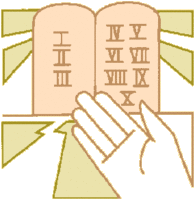 Today we commemorate Moses, who was born in Egypt several generations after Joseph brought his father Jacob and his brothers there to escape a famine in the land of Canaan.
Today we commemorate Moses, who was born in Egypt several generations after Joseph brought his father Jacob and his brothers there to escape a famine in the land of Canaan.Jacob's descendants, enslaved by the Egyptians, were ordered to kill their male children. When Moses was born his mother put him in a basket and set it afloat in the Nile River, where Pharaoh’s daughter found him and raised by her as her own son (Ex 2:1-10). At age 40 Moses killed an Egyptian taskmaster and fled to Midian, where he worked as a shepherd for forty years.
Then the Lord called him to go back to Egypt and tell Pharaoh, “Let My people go, that they may hold a feast to Me in the wilderness” (5:1). After a series of plagues, the Israelites celebrated the first Passover, Pharaoh capitulated and Moses led them out. At the Red Sea the Egyptian army was destroyed and the Israelites passed to safety on dry land (Ex 12-15). At Mount Sinai they were given the Law and erected the Tabernacle (Ex 19-40). Because of disobedience, they had to wander in the wilderness for forty years. Moses himself was not allowed to enter the Promised Land, although God allowed him to view it (Deut 34).
In the New Testament Moses is referred to as lawgiver and prophet. The first five books of the Bible are attributed to him.
When I suggested the topic of Vocation for the Labor Day edition of the Lutheran Carnival, I realized that many readers, whether Lutheran or not, might not have a clear understanding of this article of faith. So before introducing this week's bloggers, I'll provide a bit of background.
The Cranach Institute includes a well-linked page on vocation. Here is the introduction by Dr. Gene Edward Veith, Institute director and World Magazine editor:
"When we pray the Lord's Prayer," observed Luther, "we ask God to give us this day our daily bread. And He does give us our daily bread. He does it by means of the farmer who planted and harvested the grain, the baker who made the flour into bread, the person who prepared our meal." We might today add the truck drivers who hauled the produce, the factory workers in the food processing plant, the warehouse men, the wholesale distributors, the stock boys, the lady at the checkout counter. Also playing their part are the bankers, futures investors, advertisers, lawyers, agricultural scientists, mechanical engineers, and every other player in the nation's economic system. All of these were instrumental in enabling you to eat your morning bread.
Before you ate, you probably gave thanks to God for your food, as is fitting. He is caring for your physical needs, as with every other kind of need you have, preserving your life through His gifts. "He provides food for those who fear him" (Psalm 111:5); also to those who do not fear Him, "to all flesh" (136:25). And He does so by using other human beings. It is still God who is responsible for giving us our daily bread. Though He could give it to us directly, by a miraculous provision, as He once did for the children of Israel when He fed them daily with manna, God has chosen to work through human beings, who, in their different capacities and according to their different talents, serve each other. This is the doctrine of vocation.
Misunderstanding Justification vis-à-vis Vocation may lead us to undervalue our callings, to set false priorities ("my calling is better than yours"), or to falsely elevate human works at the expense of the divine work of the forgiveness of sins through the merits of Christ. Following the list of participants in this week's carnival, I append more information on Vocation, that you might have a greater appreciation for this remarkable gift of God.
Wearing "masks of God" this week are the following servants He has provided you as He works to strengthen your faith, guide your footsteps, open your minds, sharpen your wits, focus your studies, and otherwise grant "all that [you] need to support this body and life (Small Catechism, Explanation of the First Article of the Apostles' Creed)" while preserving you "steadfast in the true faith until life everlasting. (The Lutheran Hymnal, Communion Dismissal)"
- All Christians have the calling to care for our neighbor, especially for our fellow believers: "So then, as we have opportunity, let us do good to everyone, and especially to those who are of the household of faith. (Galatians 6:10 ESV)" With this in mind, I ask that you please read Hurricane Assistance and respond as the Lord moves you from the storehouse of blessings which He has granted you.
- Dan at Necessary Roughness offers his reflections on how his life was redefined through decisions made by his employer in reaction to an economic situation as he asks, False Choice Leads to Vocation?
- The Masks God Wears from Be Strong in the Grace opens a window on many vocations as she observes the sickness and death of her pastor's young son.
- Pastor Todd Peperkorn, The Lutheran Logomaniac, offers the Word of the Week: Mercy. Mercy is one of the chief characteristics of God and is how He "shows His power." But what does mercy mean for a Lutheran? In part, I'll venture that it means that God exercises His "vocation," hearing our prayers and answering them out of love.
- "Random Dan" is a geologist as well as a Lutheran, a blogger, and an instigator (with Intolerant Elle) of this Lutheran Carnival. In Random Thoughts of a Confessional Lutheran, Dan puts on his geologist (hard-) hat and reminds us that New Orleans Is Sinking. Sometimes being true to one's vocation means voicing unpopular thoughts and Dan opines that it might be a good idea if New Orleans is never rebuilt.
- And speaking of Intolerant Elle (we were, weren't we?), she says, I’m Going on a Field Trip: A Preliminary Report. She then outlines how her well-catechized Lutheran self will compare and evaluate "the biggest and fastest growing church in Alaska." Certainly this fits our vocation as Christians: "Beloved, do not believe every spirit, but test the spirits to see whether they are from God, for many false prophets have gone out into the world. (1 John 4:1 ESV)
- The Life of a Pastor's Wife at Lonesome Grove is one of understanding and living out her vocation. We Believe, Teach, and Confess allows us to see through her eyes as wife of a pastor and mother of a twelve year old daughter who's entering her father's public catechetical instruction.
- Cyberstones, Pastor Petersen's labor of blogging love, casts a stern eye upon those who misunderstand vocation and who covet or usurp those vocations not granted by God as he asks, Everyone a Minister: Re-cooked Vocation?
- Sean's Hot Lutheran on Lutheran Action includes constructing a ceramic shrine to Martin Luther's words, And then, while I slept, or drank Wittenberg beer … the Word so greatly weakened the papacy that never a prince or emperor did such damage to it. In his new beer mug, Sean provides humorous insight into the certain truth that it is not our work but the work of God which brings people to faith in Christ Jesus.
- Jeremy Abel certainly seems to enjoy Living Among Mysteries. In Loyalty: Our Stories Define Our Duties, he critiques a book by George P. Fletcher and examines how we remain faithful to our vocation when challenged by disagreement from within an organization with which we are allied.
- Pastor Greg Alms of incarnatus est offers Incarnation, Vocation and Certainty, wherein he expounds on Luther's understanding of vocation and incarnation and sacraments. He shows how vocation is similiar to the sacraments in that both have a word of God attached to a place or thing to direct us where God would have us be.
- Mike Benoit of Amor et Labor ponders a change in vocation. He's been asked for a Statement of Faith from an Anabaptist seminary in order to teach a course in their counseling department. He would love your quia comments.
- How do women in the workplace jibe with our understanding of vocation? Does voluntary sterilization and intentionally removing all opportunity to conceive and bear children run counter to God's calling in marriage? Pastor Walter Snyder of Ask the Pastor answers Questions on Working Women and Birth Control.
- Last, and certainly not first of our vocation-tinged samples is my own Consider Your Place in Life. Here I attempt to emphasize to the centrality of Justification as lived in our vocations by examining the emphasis the Small Catechism places upon preparing to confess our sins by examining ourselves according to our vocation.
- A final offering comes from dokeo kago grapho soi kratistos Theophilos. Richard Anderson speculates on the Origin of the Christian Doctrine of Atonement. There always seems to be at least one submission which leads the host to strongly debate its inclusion in this Carnival. While not flatly denying a quia subscription to the Confessions or the veracity of Scripture, the style and substance of the post certainly differ from the understanding of the synoptic Gospels normally held in Lutheranism. That (plus the fact that it deals less with vocation than any of the other blogs included) leads me to place it at the end of the list. I didn't want to omit it, however, since it certainly provokes thought and invites us to reconsider the theological perspective of each of the Evangelists.
In the years since Luther, others have studied and taught in greater detail on the article of Vocation. A summary of some of their work is available through The Lutheran Church — Missouri Synod through its Board for World Relief and Human Care. That item links to the following essays (all posted in PDF).
- God at Work (Gene Edward Vieth) provides an overview of the topic, "Every Christian has a particular calling from God."
- Called by the Gospel (Gene Edward Vieth) discusses our place in Christ's body, the Church. It shows how Christ "hides Himself," not only in the pastor through the forgiveness of sins, but in all members of the body as we gather around Word and Sacrament and practice what Luther preached concerning "the mutual conversation and consolation of the brothers and sisters. Matthew 18:20: 'Where two are three are gathered together....' (Smalcald Articles, III.4.)"
- Called to Be Citizens (Gene Edward Vieth) examines our life under government and the rule of law, including such topics as patriotism and nationalism.
- Called to Our Work (Gene Edward Vieth) discusses the heart of what most of us consider our Vocation; i.e., our jobs and careers. Of such employ, Dr. Vieth begins by saying, "We don't choose our vocations; God chooses them for us."
- Gustaf Wingren's Confession of the Doctrine of Creation for an Understanding of Vocation & Sanctification (Eric Andræ) translates Wingren's examination of the origin of Vocation in the origin of all that is. Andræ provides copious annotation to explain his translation and to aid understanding.
- Masks of God offers a close look at God "hiding" himself in ordinary people as He works His extraordinary grace and mercy among all mankind.
- Right and Wrong in the Workplace (Jim Truesdale) offers insight into the moral decisions we make as we live out our vocation in the marketplace.
- Vocation: Fruit of the Liturgy (John T. Pless) reveals "the liturgy after the liturgy" — the work we do for others following the work done in and for us during the Divine Service.
- Your Family Vocation (Gene Edward Vieth) reveals God working "through us in our callings as parents, spouses and children."
"Therefore, my beloved, as you have always obeyed, so now … work out your own salvation with fear and trembling, for it is God who works in you, both to will and to work for his good pleasure. (Philippians 2:12-13 ESV)"
Who was that masked God?
Reactions are personal and political, thoughtful and theological. We have connections to high gas prices, divine judgment, and beloved family members. We have eye-witnesses, insightful comments, and inciting rhetoric. Calls to dive in and rebuild and demands that we never build anything else in a sub-sea level bowl. I'm not sorting, so alphabetical by blog name is the way this will go.
If you find other, significant contributions to this collection, please let me know and, if I agree, I'll post them, also.
All that I have so far here at the Alley is a brief note on providing Hurricane Assistance.
Ask the Pastor contributes an extended essay on divine justice and mercy with A Christian Response to Suffering and Death.
From Be Strong in the Grace we have Hurrican Katrina - Some Ways to Help, which focuses on things which can be done through the Evangelical Lutheran Synod and the Wisconsin Evangelical Lutheran Synod.
Mutti Beck at Beckfest shows her little Arkansas town's initial response to a refugee influx and continues in Refuge to show what they've begun doing, including hosting birthday parties for the displaced children.
Bloghardt's Reflector gives personal insight as people began asking, "How's Your Family?", showing also how hard hit are his brother LCMS clergy in the area. He then provides More Information on Relief Efforts.
World Magazine blogger Bunnie Diehl notes disgusting conditions and classical violin music in the Superdome in They Should Have Something. Then, with her understanding of original sin, asks who are the Good People?. Finally, she frees her inner economist to speak In Defense of Price Gouging.
The Burr in the Burgh covers several angles: Pastor Stiegemeyer comments on International Responses to Hurricane Katrina, invokes both William Golding and our Lord Jesus in Horror in the Big Easy, and offers a link to the the work of ham radio operators in Katrina's aftermath.
Chaplain Dave's Newsletter, the work of Air Force chaplain David Reedy, provides a look what happened at Keesler AFB in Biloxi, Mississippi and then shows Washington, DC Welcoming Victims from Gulfport.
Stan Lemon's Confessions of a Young Lutheran reminds us that In Christ the Rain Does Care!
Cross+Wise weighs in with theological and human insight in Fallen Levees, Fallen Man, Fallen World.
Repent. The Rain Doesn't Care. Rejoice. God Does. The title tells you why you should read this post from Pastor Petersen at Cyberstones.
In Full Throttle & an Empty Gas Tank, we see various concerns moving someone hundreds of miles away in Indiana, as he watches his father's reactions and worries over a missing friend in Oranges and Apples.
Pastor Alms of incarnatus est notices how crisis counselers are being mobilized and asks How much does crisis counselling help — or hurt? His answer is based in part upon a linked article from The New Yorker on "The Grief Industry."
The lady who offers glimpses into her world through The Life of a Pastor's Wife at Lonesome Grove falls back upon God's Word and our hymnody in when through fiery trials.
Ryan Fouts offers the locus Christ in Catastrophe at his Little Loci blog.
At Lutheran Jargon, Minister2B posits New Orleans - Random Thoughts - May be Controversial, wherein he questions the wisdom of rebuilding the Crescent City, comments on human ill-behavior, and finally, blames the French for the mess. He then goes on to lampoon FEMA's inept responses in Feds didn't expect crime in New Orleans?!
Meanwhile, Melancthon Sins Boldly takes to task those who place ultimate blame upon the victims of the disaster with Not Curvatus in Se Enough.
Necessary Roughness shows the need for A Gondola for Venice, Please, using in-house "before and after" photographs from Halliburton.
Poor Michael's Almanac briefly reminds us that (and why) Creation Groans.
Random Dan at Random Thoughts of a Confessional Lutheran speaks from his education and vocation as he joins those who think that rebuilding New Orleans would be unwise. He then provides interesting figures about relative worth, showing that even expensive gasoline might be a bargain as he cites statistics from the Kansas Independent Oil and Gas Association.
Pastor Fish admits that there is Something Fishy going on as he takes note of Real Evil.
Territorial Bloggings allows us to join Glen Piper in Weeping for New Orleans as he examines the mess and the reaction of the world and the Church.
The Uneasy Priest is another blogger who weighs in on the sudden and dramatic increase in fuel prices with Gasoline and Economics.

